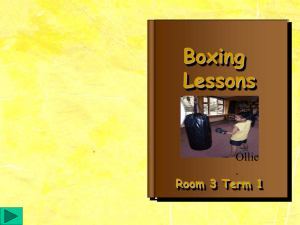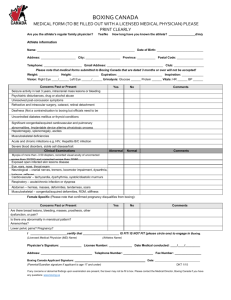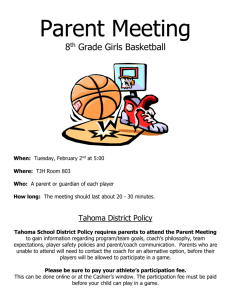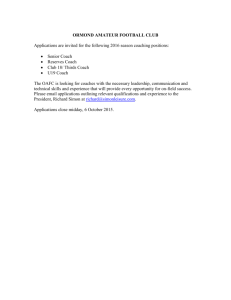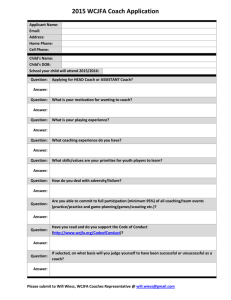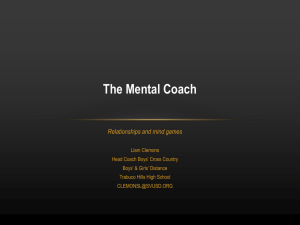Best practice guide
advertisement
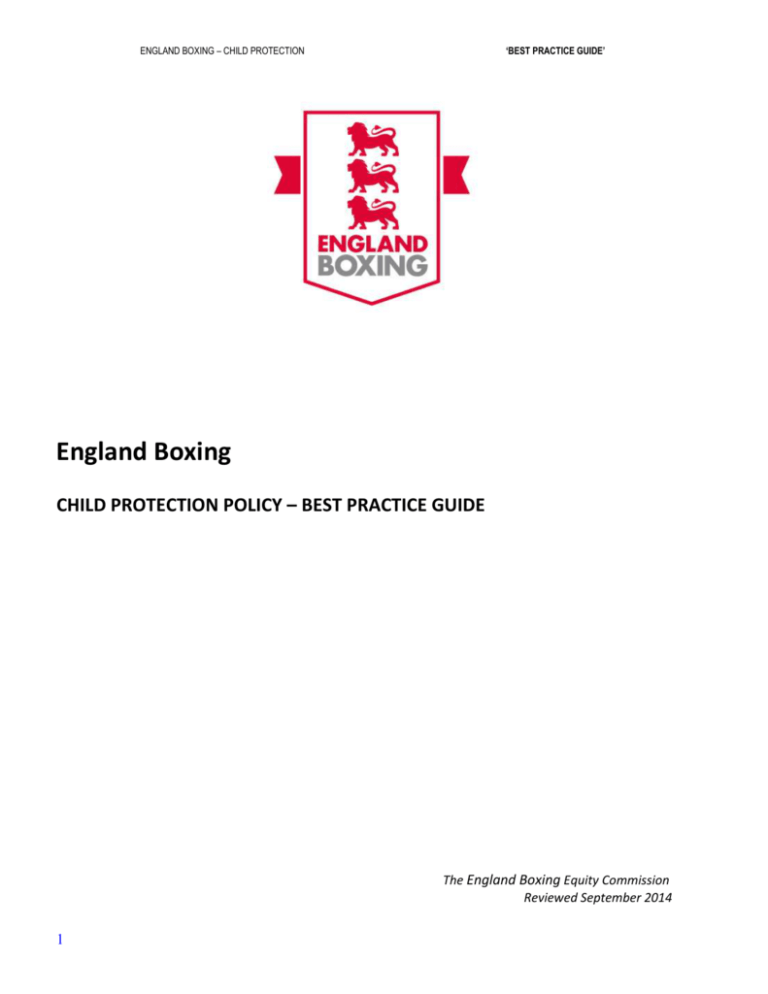
ENGLAND BOXING – CHILD PROTECTION ‘BEST PRACTICE GUIDE’ England Boxing CHILD PROTECTION POLICY – BEST PRACTICE GUIDE The England Boxing Equity Commission Reviewed September 2014 1 ENGLAND BOXING – CHILD PROTECTION ‘BEST PRACTICE GUIDE’ CHILD PROTECTION IN BOXING RECOMMENDED BEST PRACTICE & CODES OF CONDUCT This section has been adopted in the form recommended by the Child Protection in Sport Unit. It is the responsibility of adults and children to treat one another with dignity, respect, sensitivity and fairness. Discriminatory, offensive and violent behaviour are unacceptable within England Boxing and complaints will be acted upon. All should be encouraged to demonstrate exemplary behaviour in order to promote children’s welfare and reduce the likelihood of allegations being made. The following are common sense examples of how to create a positive culture and climate within boxing. BEST PRACTICE & CODES OF CONDUCT – COACHES & VOLUNTEERS 2 Always work in an open environment for example avoiding secretive or unobserved situations and encourage open communication; Always ensure that you do not spend excessive amounts of time alone with a child[ren] away from others; Always challenge injustice; Always treat Children and Young People equally, affording respect and dignity; Always put the welfare of each Child or Young Person first, before winning or achieving goals; Always recognise the developmental capacity of the child and do not push them against their will or train them excessively; Always maintain a safe and appropriate distance with athletes for example, it is not appropriate for adults to have an intimate relationship with a Child or Young Person or to share a room with them in cases of emergency where you must enter their room, always have another adult present leaving the room door open; Always seek to build balanced relationships based on mutual trust which empowers Children and Young People to share in the decision making process; Always make sport fun, enjoyable and promote fair play; Always ensure that if any form of manual physical support is required, it is provided openly and according to guidelines provided by the Coach Education Programme. Care is needed, as it is difficult to maintain hand positions when a Child or Young Person is constantly moving in training. Where physical contact is practiced in sport on a frequent basis [for instance gymnasium exercises] the parents should always be consulted and their agreement gained; Always keep up to date with technical skills, qualifications and insurance in sport; ENGLAND BOXING – CHILD PROTECTION ‘BEST PRACTICE GUIDE’ Always involve parents and carers wherever possible. For example, encouraging them to take responsibility for their children in the changing rooms. However even in those circumstances, never allow a single adult to enter alone; When supervising children and young people in changing rooms, always work in pairs and in these circumstances never supervise children and young people of the opposite gender; Always ensure that you have details of a child’s medical needs if any, whilst the child or young person is under your supervision [see Parental Consent Form]; Always remember that you are a ‘role model’ and never condone the use of any performance enhancing drugs; Always ensure that appropriate seat restraints are used when traveling with children and young people; Never invite a child or young person to your home without a parent , guardian or appropriate adult present; Always ensure that if mixed teams are taken away, they should always be accompanied by a male and female member of staff. However, remember that same gender abuse can also occur; Always ensure that at tournaments or residential events, adults do not invite children into their rooms; Always be an excellent role model, this includes not smoking or drinking alcohol or use foul or inappropriate language in the company of Children and Young People; Always give enthusiastic and constructive feedback rather than negative criticism; Always secure parental consent in writing to act in loco parentis, if the need arises to administer emergency first aid and or other medical treatment; Always keep a written record of any injury that occurs, along with the details of any treatment given; Always request written parental consent if club officials are required to transport young people in their cars, which should be done by at least two adults; At tournaments, dissent towards officials / results will not be tolerated; Coaches should at all times be respectful to officials – if legitimate complaint is justified it should be aired in a dignified manner away from public gaze and in the absence of athletes. Coach / Athlete Ratios The following are the recommended ratios For groups including children under 11 years of age : 1:8 For groups comprising of children over 10 years of age : 1 : 10 There must be at least 2 adults present at any one time for groups of 4 or more For mixed gender groups of any size, there must be at least one male and one female present 3 ENGLAND BOXING – CHILD PROTECTION ‘BEST PRACTICE GUIDE’ Practices never to be sanctioned The following should never be sanctioned. You should never: Engage in rough, physical or sexually provocative games, including horseplay with a Child or Young Person; Share a room with a Child or Young Person; Allow or engage in any form of inappropriate touching; Allow children to use inappropriate language unchallenged; Make sexually suggestive comments to a Child or Young Person, even in fun; Upset or reduce a Child or Young Person to tears as a form of control; Fail to act upon and record any allegations made by a Child or Young Person; Do things of a personal nature for Children, Young Persons whether disabled or not or whether an adult or not, that they can do for themselves; Note : It may sometimes be necessary for staff or volunteers to do things of a personal nature for a Child or Young Person, particularly if they are disabled. These tasks should only be carried out with the full understanding and consent of parents and the Child[ren] or Young Person[s] involved. There is a need to be responsive to a person’s reactions. If a person is fully dependent on you, talk with them about what you are doing and give choices where possible. This is particularly so if you are involved in any dressing or undressing of outer clothing, or where there is physical contact, lifting or assisting a Child or Young Person to carry out particular activities. Avoid taking on the responsibility for tasks for which you are not appropriately trained. Incidents that must be reported / recorded If any of the following occur you should report this immediately to the appropriate officer or club member and record the incident. You should also ensure the parents of the child are informed: If you accidentally hurt an athlete; If the athlete appears distressed in any way; If an athlete appears to be sexually aroused by your actions; If an athlete misunderstands or misinterprets something you have done. CODES OF CONDUCT – ATHLETE - BOXERS: 4 Always do your best in every situation; Be punctual at all times for training and competition and be ready and prepared at the appropriate time given to you by your coach or team manager; ENGLAND BOXING – CHILD PROTECTION ‘BEST PRACTICE GUIDE’ Attend all meals and eat the appropriate food ensuring that adequate levels of nutrition and fluids are consumed; No boys should enter girls changing rooms and vice versa; No intimate relationships shall be allowed between athlete - boxers and coaches travelling together; Treat all accommodation with the utmost respect ensuring that they are not the subject of damage and are left tidy when vacating – all damage or losses must be reported to the coach or team manager; Never bring other persons of the opposite gender to yourself into accommodation areas unless permitted and supervised by your coach or team manager; Never bring alcohol or drugs into your accommodation or purchase or consume such substances whilst travelling or accommodated during England Boxing tournaments, camps or squads; Never use foul or other inappropriate language; If you are stopped or detained by hotel security, police or other recognised authority, you must inform your coach or team manager immediately; On tours, camps or squads, all boxers should be in their respective rooms at the following times and should not leave unless in an emergency: 18 years and over – at the discretion of the coach or Team manager; Under 18 years – 10.30pm Under 15 years – 10pm Under 13 years – 9.30pm Always observe curfews set by your coach or team manager – breaches may result in disciplinary action; There may of course be circumstances where these timings cannot be achieved however variations may only be sanctioned by the chief coach or team manager; 5 If you cannot sleep when retired, you should be resting; If you feel unwell or have an accident, you should report this to your coach or team manager immediately; At tournament venues, always treat it with respect and always ensure that you leave it tidy after your use; You must always be respectful to England Boxing coaches, team managers and officials – dissent will not be tolerated during competition under any circumstances; Boxers should not take or otherwise interfere with another boxer’s or coaches property; When travelling in vehicles seat restraints must be used at all times; ENGLAND BOXING – CHILD PROTECTION ‘BEST PRACTICE GUIDE’ When travelling abroad all boxers must respect the local culture, clothing and customs of the country visited; Boxers should at all time be aware, when travelling abroad they are representing England Boxing and are ambassadors of England Boxing and their country; Always obey instructions given by coaches or the team manager; Always be polite to all people you meet whilst a member of a team or squad, particularly your opponents and fellow team members; Always be aware of your personal safety as you would in your home environment, do not wander off alone, do not engage in conversation with strangers and under no circumstances should you enter a stranger’s vehicle; If you ever become separated from your party whilst abroad, always report to the nearest police station, if at a port or airport contact the port security post or at or near a tournament venue, contact a member of the organising committee; Take responsibility for yourself in and out of competition or training; Use any free time constructively relaxing or focusing on the next stage of training or competition; Always respect and never underestimate your opponent; Always encourage and support your fellow team members at all times without behaving in an unsporting way towards your opponents; Never bully a fellow team member or an opponent – this will not be tolerated under any circumstances. CODES OF CONDUCT & GUIDANCE – PARENTS & CARERS In order to gain the best experience from their involvement in sport, children and young people generally rely on their parents / carers for both emotional and financial support. This influence can be critical as their child becomes involved in national squads and competition. It is hoped that the following will prove useful to parents and carers to play a positive part in their child’s progress in boxing. 6 Support your child’s involvement and help them to enjoy all that boxing has to offer; Encourage respect for the rules of boxing, promote and support fair play and the acceptance of an official’s decision; Encourage recognition of good performance in others as well as themselves; Do not applaud opponents unforced errors or their misfortune; Uphold high standards of behaviour, appearance and the importance of being a good team player; Establish a positive partnership with the coach in order to help provide the best possible balance between the demands of boxing, education and home; Ensure that your child is aware of all the arrangements made for team tours and trips; Be punctual when collecting or delivering your child to the gymnasium or venue; Ensure that your child fully understands the requirements of this Codes of Conduct for boxers; Never exert undue pressure on your child to compete or to gain results. Be realistic about your child’s ability; Always use appropriate language and ensure your child does the same; ENGLAND BOXING – CHILD PROTECTION ‘BEST PRACTICE GUIDE’ Under no circumstances condone a rule violation or the use of prohibited substances including alcohol and tobacco; Ensure that your child understands that they should take responsibility for their own safety; Show respect and trust the coach working with your child; If you have any questions or queries, please deal directly with the coach and not in front of the child. Do not compromise the relationship between the coach and the child; Encourage your child to take responsibility for their own actions both in and beyond the competition / training ring e.g. not blaming others or seeking excuses for their own shortcomings or mistakes, encourage their greater independence; You should immediately inform your child’s coach if the child sustains an injury or illness however minor which will effect in any way the child’s ability to train or compete; In liaison with the coach, it may be your responsibility to transport your child to ensure punctuality at training sessions and at arrival and departure points when travelling to training camps, tours or competitions; When travelling to events, please ensure that you do not compromise the authority of the coach or team manager, it is always preferable that if travelling, you should find accommodation in an alternative hotel to that which the team is residing in; When at training or competition, always remember that your role is that of supporter. Please allow the coach space to work with your child and never comment publicly on any instruction the coach may give as this could be counter productive; If you are acting as a ‘responsible adult’ for the team, you must have successfully completed a England Boxing approved ‘Safeguarding & Protecting Children workshop’; You should always ensure that coaches, team managers and boxers are aware at all times of how you may be contacted when / if needed whilst the child is away from home taking part in boxing activities. All members of the England Boxing should note that breaches of these Codes of Practice may result in disciplinary proceedings in particular, discriminatory, offensive and violent behaviour which are profoundly unacceptable and breaches of this nature will be vigorously and robustly prosecuted through the England Boxing disciplinary process. If in doubt regarding what action should be taken regarding any issues around Children and Young People – contact your Club Welfare Officer, Divisional or Regional Welfare Officer or the England Boxing National Child Protection and Equity Manager. See also linked Document: Travel Safe with Children – Team Managers 7
